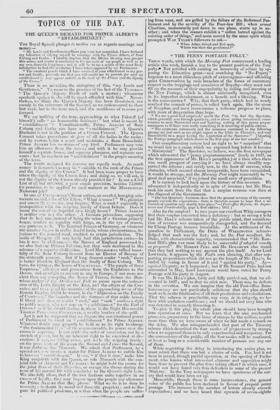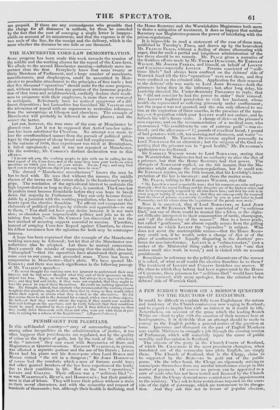" THE PENNY POSTAGE FOLLY."
THESE words, with vliich the Morning Post commenced a leading article this week, furnish a key to the present position of the Tory paAy.• Not satisfied with earning an immensity of odium by op- posing the Education grant—and overdoing the " No-Popery" bugaboo to a most ridiculous pitch of extravagance—and offending quiet Conservatives by rude breaches of the forms of customary respect to the trappings and associates of Royalty—they must now fill up the measure of their unpopularity by railing and sneering at the New Postage, which is almost universally recognized, even in its imperfect development, as a benefit and a blessing. What is the consequence ? Why, that their party, which had so nearly reached the summit of power, is rolled back again, like the stone of Sisyphus, and must recommence a toilsome progress to place, with more of desperation than hope. " Wc are a good deal surprised," quoth the Post, "to find the S'pectittor, Ivhich generally sces through quackery, anti is above giving intentional coun- tenance to mere ;Ministerial cant and humbug, writing of this penny prepos- terousness as if there were really something in it deserving of public esteem. " The erroneous statements mid the nonsense contained in the following passage are just such as one might expect in the Globe or Chronicle, and very discreditable to a paper having the reputation of the Spectator." [Quoting the Postage paragraph which stands in the first page of our last number.] Our complimentary censor had no right to be " surprised" that we stood fast to a cause which we espoused long before it became " Ministerial." The Spectator, we believe, was the first newspaper which advocated the " pettily preposterousness," (early in 1837, on the first appearance of Mr. Hises pamphlet,) at a time when there was small prospect of carrying it : we have always steadily sup- ported the scheme; and surely now, in the hour of success, when obstacles, which seemed almost insuperable, have been vanquished, it.would be strange, and the Morning Post might reasonably be " a good deal surprised," if we joined the small crew of grumblers. It is curious to look back upon the history of this measure. We advocated it independently or in spite of revenue ; but Mr. IIthr. took his start from the fact that a surplus revenue was then at the disposal of the Government. " The last Quarterly Accounts show that the present revenue of the country greatly exceeds the expenditure : there is therefore reason to hope that a re- duction of taxation may shortly take place."—(Pmt-cSice Reform, its Impor• lance and Practicability, page 1, first edition ; 1837.) Alas for the surplus! in two years our excellent Whig managers find their surplus converted into a deficiency : but so strong a hold had Mr. HILL'S scheme taken of the public mind, that considera- tion of revenue was comparatively disregarded, and the demand for Cheap Postage became irresistible. At the settlement of the question in Parliament, the Duke of WELLINGTON acknow- ledged that such was the fact ; and, let the Post recollect, the Duke, NN ith characteristic sagacity, recommended that " Mr. Row- land Hill's plan was most likely to be successful if adopted exactly as proposed." Sir ROBERT PEEL and Mr. GOULBERN also stated that they had nothing to say against the plan itself. As for Lord Lownam, it appears by the Poses own showing, that after sup- porting propositions which did not go the length of' Mr. Hita.'s, he ended by voting in favour of it and " against his party." Ay— against his party, as it happened ; but if Sir Roamer Pstin had not miscarried in May, Lord LOWTHER would have voted for Penny Postage with his party in August. It VMS Mr. IIthes plan, fairly and fully carried out, that we ad- vocated in 1837; and to that we stick now. There may be defects in the execution. We can itnagine that the old Post-office Bum- bureaucracy are not particularly solicitous that the plan should work well, to the falsification of all their predictions and calculations. That the scheme is practicable, nay easy, in its integrity, we be- lieve with unshaken confidence ; and we should not envy hint who was detected in secretly thwarting it. To give it fair play, the whole plan should have been brought into operation at once. But we learn that the nice mechanical processes, preparatory to the issue of stamps by the million, require more time than we were aware of when we last made a remark on the delay. We also misapprehended that part of the Treasury minute which described the four modes of prepayment by stamps, when we supposed them to be only experimental and temporary. For the convenience of the public, all the four modes will be continued, at least as long as a considerable number of persons use any We of them.
While regretting the delay in introducing the entire plan, we must admit that there was but a choice of evils. For, had it not been in actual, though partial operation, at the opening of Parlia- ment, who knows what interested clamour and opposition might have done to prevent the plan from taking effect ? in which ease, it would not have found very firm defenders in some of the present Ministry. In the Tory newspapers we have specimens of the out- cry that would have been set up. Meanwhile, thought there is some inconvenience, the general voice of the public has been declared in favour of prepaid penny postage. The increase in the number of letters already exceeds expectation ; and we have beard that upwards of' seven-eighths are prepaid. If there are any curmudgeons who grumble that the charge for all distances is uniform, let them be consoled by the filet that the cost of conveying a single letter is inappre- ciable on account of its minuteness; and that the expense is at the two ends of the line, for the receipt and the delivery, which is the same whether the distance be one mile or one thousand.



























 Previous page
Previous page